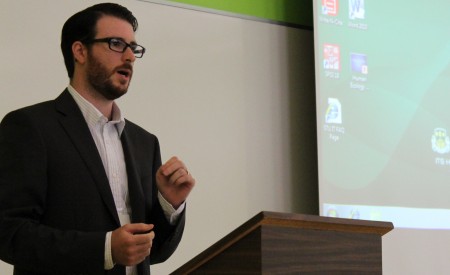
Afghan Detainee Issue Still Unresolved for Canada
Matthew Sheriko, Experience Congress 2011
The war in Afghanistan has shown an inconsistent commitment to international humanitarian from Canadian forces’.
The treatment of detainees by Canadian forces in Afghanistan was the subject of Marc Gionet’s presentation to the Conference of the Canadian Peace Research Association.
Gionet, a professor of Human Rights at St. Thomas University in Fredericton and the Director of the Atlantic Human Rights Centre, has been studying the international law violations by Canadian forces with detainees in Afghanistan.
“Canada holds an obligation to contribute towards creating conditions for post-conflict peace. Neglecting this obligation will undermine expressed objectives of nurturing a democratic society and engaging in the protection and promotion of human rights domestically and internationally,” stated Gionet.
Canada first sent troops to Afghanistan in 2001 as a part of a coalition with the United States and Britain. Canada plans to pull out the rest of its troops from Afghanistan later this year.
Gionet delved into an issue that brought the Canadian Government under scrutiny from the public in 2009. They managed to avoid more heat from opposition parties at the time when Parliament was prorogued and hearings suspended.
He highlighted the commitments taken by Canada when they ratified Protocols Additional to the Geneva Conventions and other international and humanitarian laws. Agreements the United States didn’t sign.
These commitments made up Canada’s treatment requirements of detainees and their label as Prisoners of War [POWs].
“The main issue is distinction. There’s an obligations under humanitarian law that combatants provide distinction from civilians so it’s easy to determine who is in fact participating in the conflict and has a legal right to participate in that hostility and who does not,” said Gionet. “The US’s criticism is that the Taliban is not wearing uniform and therefore it’s providing difficulty in distinguishing from the civilian population and they are [to the US] therefore illegal combatants or they are not entitled to POW status upon capture.”
Canada has been transferring detainees to the US military and the Afghan Government and some have been subsequently tortured in Afghanistan and Guantanamo Bay.
In 2005, Canada signed an agreement with the Afghan Government that outlined conditions for transferring. When that was deemed unsatisfactory, a second agreement was signed in 2007.
“The new agreement, you have to give credit, it is an improvement over the initial agreement but it’s still unsatisfactory and it doesn’t mean that Canada is meeting its international obligations.”
Gionet emphasized Canada’s commitments that Afghanistan and the US aren’t tied to, but also the disregard of three nation’s shared binding to the International Covenant on Civil and Political Rights.
“Such disregard for Canada’s international human rights obligations… and violations of international law, undermine Canada’s objectives in Afghanistan and doing serious harm towards creating effective conditions for post-conflict peace and a harmonized Afghan society.”
He also recognized a trend in Canada that was experienced by other Western nations.
“After 9/11 there was a distinct swing toward massive erosion and clawbacks of specifically civil and political rights. Since that time, we’ve seen the pendulum come back towards a more centred or balanced focus… In terms of how much erosion takes place, is up to the citizenry. It’s how much we allow and how much we put up with without a fuss. We need to be very vocal when these incidents are taking place.”
Photo: Matthew Sheriko













